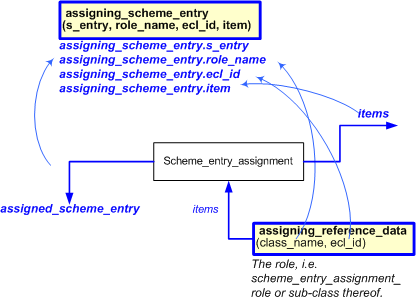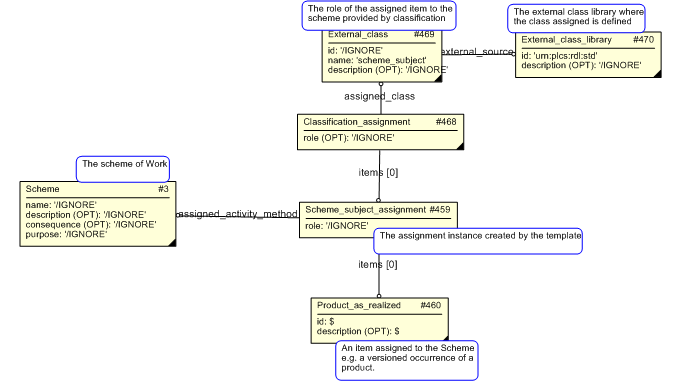Template:— assigning_scheme_entry (asg_scm_ent)
Capability:representing_scheme |
Date: 2010/02/15 21:09:12
Revision: 1.8
|
This section specifies the template assigning_scheme_entry.
NOTE
The template has been defined in the context of the capability
representing_scheme
which provides an overall description of the
relevant parts of the ISO 10303-239 information model and a description
of related templates.
NOTE
An explanation of a template and the associated instantiation path is
provided in the
Template overview
section.
This template describes the assignment an item from the scheme_entry_item_select list to an instance of scheme. It is assumed
that the instances of scheme_entry and the item to be assigned to the scheme, are inputs and have the relevant identifiers
for references purposes. That is, this template (at present) does not create instantiations of the things being related by
the assignment.
The EXPRESS-G diagram in
Figure
shows the templates and EXPRESS entities that are required
to represent the template
"assigning_scheme_entry".
The text highlighted in blue shows the template parameters.
Figure 1 — assigning scheme template model,
The EXPRESS-G diagram in
Figure
shows the templates and EXPRESS entities that are required
to represent the template
"assigning_scheme_entry".
The text highlighted in blue shows the template parameters.
Figure 2 — assigning scheme template model - consolidated,
The following input parameters are defined for this template:
The scheme_entry to which an item will be assigned.
The name of the class used to classify the scheme_entry_assignment and so
provide the context for the assignment.
The following classes and their sub-classes can be used:
ecl_id (Default=urn:plcs:rdl:std,Type='URN')
The select type which contains the list of possible subjects that may be assigned to the scheme_entry.
The following reference parameters are defined for this template:
%^target = $assigning_scheme_entry.scm_sub_ass%
The
Scheme
may be characterized by a number of parameters. E.g. a calendar_date
-- The template assigning_scheme_subject has an external reference
-- scm_sub_ass. Bind this to the local external reference
-- scm_subject. It can now be the target for assigned dates
%^scm_sub_ass = $assigning_scheme_subject.scheme_subject_assignment%
-- assign date to the assignment in the role of "planned_start_date"
/assigning_calendar_date(items=^scm_sub_ass,
date_class_name='Planned_start_date',
date_ecl_id='urn:plcs:rdl:std',
year=@2005,
month=@4,
day=@5)/
The instantiation path shown below specifies the entities that are to be
instantiated by the template.
A description of templates and the syntax for the instantiation path is
provided in the
Templates Help/Information section.
The following entities are instantiated with attributes as specified:
The instance diagram in Figure
shows an example of the EXPRESS entities and templates that are instantiated by the template:
(an illustration of the consolidated template is shown in
Figure
below.)
Figure 3 — Assigning Scheme Subject Template Instantiation
The instance diagram in
Figure
shows the graphic symbol for the template that is to be
used in other instance diagrams. The example template is:
/assigning_scheme_entry(scheme_entry='', role_name='', ecl_id='', item='')/
Figure 4 —
Characterizations
No common characterizations of the template
assigning_scheme_entry
have been identified. However, the ISO 10303-239 EXPRESS model
may enable other assignments to the entities instantiated by the template.



